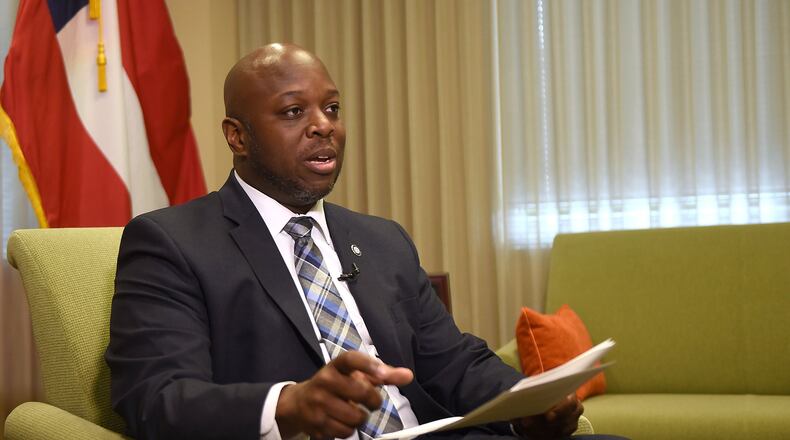Georgia prisons set a record for inmate suicides last year, with 39 men and one woman taking their own lives, an analysis by The Atlanta Journal-Constitution shows.
The AJC also found that inmate killings continued at high rates, with 30 homicides in 2022, the same number as in each of the previous two years.
The figures are yet another indication of how staff shortages, lax oversight and corruption have plagued the Georgia Department of Corrections in recent years, allowing gang violence to escalate and creating lapses in the care and treatment of inmates with mental health issues.
Last year’s 40 suicides were 13 more than in 2021 and 10 more than in 2020. Overall, during the past three years, 97 inmates in prisons operated by the GDC died by suicide. In the previous three-year period, 61 inmates took their own lives.
Likewise, the homicide total for the last three years — 90 — far exceeds the previous three-year total of 28, even as the total number of inmates in GDC facilities declined. Of the 30 known slayings last year, 29 victims were men.
Kate Boccia, president and CEO of the Alpharetta-based National Incarceration Association, a prison reform organization, said the rising tide of suicides and the continued rate of homicides in Georgia prisons represent a trend that should concern people across the state.
The numbers can’t be written off “as a simple fact of criminals getting rid of themselves,” she wrote in an email. “The propensity to give up on the expectation of living responsibly and the propensity to react violently even while being locked away for crime spills out into every Georgia community.”
To Jerrod Heath, whose brother, Christopher Heath, was found hanging in a shower stall at Smith State Prison in 2020, the rising number of suicides shows that the GDC still isn’t doing enough to address the mental health of inmates. His brother had a history of mental health issues, yet he was left in the isolation of the shower stall for days, according to a lawsuit filed by the Heath family.
“My point of view would be they still don’t have empathy toward inmates in terms of mental health...,” Jerrod Heath said.
In an interview with the Journal-Constitution, the GDC’s new commissioner, Tyrone Oliver, said he is dismayed by the suicide and homicide numbers. But he said the numbers should be seen in light of several mitigating factors.
He said that GDC staff had stepped in to prevent 44 inmates from taking their lives in 2022 and had done the same for seven more inmates since the start of this year.
“We’re saving more than we’re actually losing,” he said. “As you know, it takes four to five minutes for someone to self-harm themselves to where there’s no coming back from it. So ... (GDC staff members) are doing a good job of making their rounds, making sure they’re preventing that.”
He also stressed factors that he said must be considered regarding the homicide number, particularly the increasingly violent makeup of the prison population.
“Thirty homicides ... definitely there’s room for improvement,” he said. “But 30 out of 50,000 (inmates), from a percentage standpoint, relatively speaking ... I know it sounds bad. One is bad. But it’s not as bad when you look at the population we’re dealing with.”
The precise number and manner of inmate deaths in Georgia has been a bone of contention between the GDC and the U.S. Department of Justice, which began a civil rights investigation of the prison system in September 2021.
Last year, the Department of Justice told a federal judge that the GDC was impeding the investigation by refusing to provide documents and data related to homicides and other acts of violence. The judge subsequently ordered GDC to release the information.
The DOJ investigation is just one of a myriad of issues confronting Oliver, the former commissioner of the state Department of Juvenile Justice.
Appointed to head the GDC by Gov. Brian Kemp on Dec. 22, Oliver had been on the job less than six weeks when Brian Adams, the warden at Smith State Prison, was arrested on state racketeering charges. Adams, fired on the day his arrest was announced, is alleged to have accepted cash payments as part of an expansive scheme to bring contraband into the prison.
“Thirty homicides ... definitely there's room for improvement. ... I know it sounds bad. One is bad. But it's not as bad when you look at the population we're dealing with."
Oliver said he understands there are things demanding his immediate attention, but he wants to approach his new job “holistically.” Consequently, he’s still trying to map out his priorities, he said.
“I can’t sit here, not even two months in, and say we’re going to do X,Y,Z,” he said. “I have to look at it with the 10,000-foot view. I’ve got the DOJ investigation. I knew a little bit about what went on at Smith but didn’t know how deep it went until I got here. I don’t think anybody knew about the warden, so you’ve got to deal with that. I’m just now putting out these small fires until I can get the big picture.”
Even with the high suicide and homicide numbers, Oliver said he believes the GDC is on track to overcome some of its bigger problems. Because of an initiative by his predecessor, Timothy Ward, completed six months ago, every facility now has mental health services of some kind, he said. That should help bring down the suicide numbers, he said.
Along with the benefit of a bigger mental health footprint, he said the prison system is now seeing more individuals willing to become correctional officers, cutting into the shortage that began with the COVID-19 pandemic in 2020.
“We’re starting to get more people in the door, and as we build that out, I think the prisons are going to be a lot safer,” Oliver said. “We can hone in on some key things we need to focus on. The foundation is there. We’ve just got to make sure we don’t become complacent.”
To that end, he said he wants officers to “slow down” and realize their priorities.
“You can’t allow (inmates) to compromise you,” he said. “That’s going to be my message going forward: Do the right thing. I want to keep it simple for them. Make sure you do the right thing all the time, because eventually you’re going to get caught. And if we catch you, we’re going to hold you accountable.”
Keep Reading
The Latest
Featured



